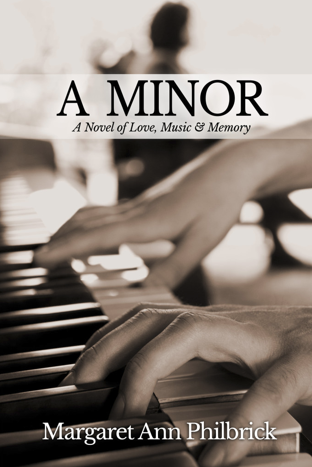Writer Margaret Ann Philbrick recently released her first novel, A Minor. Described as “a deeply moving novel that touches upon love, creativity, and memory, A Minor is a life-giving love story exploring the healing power of music for those suffering from Alzheimer’s or dementia.” Philbrick shares on her process and what inspired the writing of this book.
What inspired you to spend four years working on A Minor?
My children all play the piano, and our oldest son’s teacher requested that a parent sit in on the lessons and take notes. We would then review with him during the following week. As he moved on to college, I was left with a notebook full of wisdom that needed to be shared, but I didn’t have the framework for an idea. While I was having lunch in South Haven, Michigan, I started talking to my husband about what it would be like for a concert pianist to lose his or her memory. That question took me on a one year research journey to find the answer.
How did you go about your research?
I started with Oliver Sacks because he is one of the most well-known neurologists in the field. I read his books and watched YouTube videos of him talking about his patients. His work led me to many other experts and their writings. Once I completed that investigation, I embarked on several more months of research into the life of a concert pianist. Howard Reich’s biography of Van Cliburn was one of the most helpful. Also, I interviewed many people who had been touched by dementia and Alzheimer’s. Once I assessed all the research, I knew there was a story to mine out of that mountain.
Talk about your creative process. How did you write the book?
I’m a pretty insecure writer having been a Lit major and constantly reading books that I feel are beyond my own creative abilities. I actually think this is a good thing because I relied on the discipline of prayer before I sat down to write each day, knowing I couldn’t do this project alone. I’d spend time asking the Lord for creativity, original thought, wisdom, memory, whatever I needed to write the next ten pages. I’m disciplined when I get into a project, so I would write every day and then revise the next day what I wrote the day before and then move on. I always set goals for myself—another ten pages, finish the chapter. As I’d move along, another piece of research would be required, and I’d go off on a tangent for a day or so and then come back to the writing.
Did you use the notebook from your son’s piano lessons?
Oh, definitely. In many ways the voice of the main character is the voice of my son’s teacher. There are aspects of her in the work that I’m sure she’ll recognize when she reads it, like her clogs. She always wears these precarious, high-heeled wooden clogs. I’ve never known anyone to wear shoes like this in the summer with bare feet. She’s a fascinating conundrum.
Your book has some unique features, like a Discussion Guide in the back and recorded music in the ereader that anyone can hear while they are reading and live links to other resources. How did all that happen?
Well, I love Koehler Books because they are open to thinking outside the box of what a book can be. When I created A Minor, I thought about the music first. If you were only listening to the story, what would it sound like? Then I outlined all the musical works, and I’d listen to them while writing. It was important that the music told the story as well if not better than the words. Eventually, the idea came to me that I wanted the reader to have the same experience. Koehler Books was open to partnering with me in creating that experience. My husband was an enormous help as well. The Discussion Guide is for the classroom or book clubs. As a teacher, it comes naturally for me to ask questions so people can learn more. The live links send the reader to the places where they can get help with memory issues in their own family or even for themselves.
One of your questions in the Discussion Guide addresses the importance of the protagonist maintaining the innocence of her protégé even though she could have taken advantage of him. Why did you decide to go that way and do you think American culture has lost its innocence?
Clare knows that the purity of Clive’s imagination is tantamount to his artistic interpretation of the works; it is a competitive advantage he has and a winsome one. She chose to not compromise that advantage. Yes, the loss of innocence in American culture is negatively affecting the power of our imagination and ultimately our innovation, which has always been an edge for us. When everything is openly revealed it hinders our ability to create, to make pictures for ourselves and interpret through the lens of what we know and experience. Dean Koontz has just written a novel that addresses this beautifully. It’s called Innocence. Making the choice to maintain one’s innocence and even more altruistically, the innocence of another, is expanding the pure heart of the child in all of us, and that is a great gift.
To buy A Minor
To read more of Margaret’s writing
